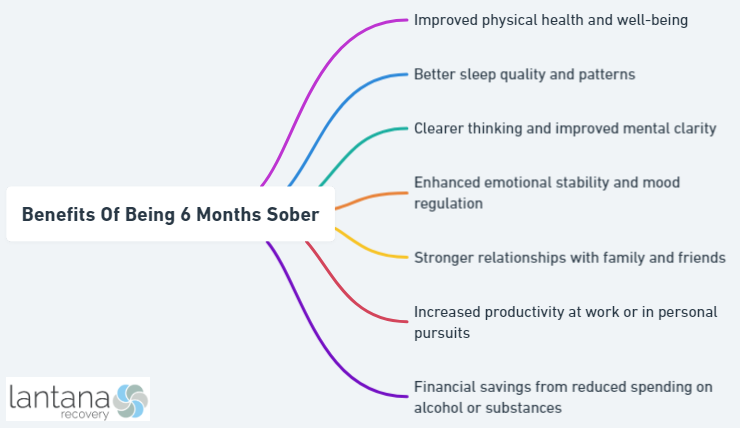Key takeaways:
- 6 months of sobriety requires patience, determination, and commitment.
- Sobriety for 6 months results in positive changes in physical and mental health.
- Appearance improves, and liver and brain damage are controlled.
- Relationships with family and friends improve, and social anxiety reduces.
- Emotions become more balanced, and healthy sleep patterns are established.
- Celebrating sobriety milestones helps to stay motivated.
- Long-term sobriety can be achieved through support groups, meditation, volunteering, sports, and self-awareness of triggers.
- Staying away from alcohol, addressing resentments, seeking help when needed, and being grateful are important for maintaining sobriety.
- A relapse is not the end of the journey; seeking help and staying motivated is key.
6 months of sobriety is a long journey of patience, challenges, and determination. You may never have expected to get this far in your journey, but you have shown a great deal of commitment to get here. Now, there are a lot of things that happen in between these 6 months, from changes and improvement in mental health to one’s physical health. Let’s take a look at what happens when you stay stopped for this period of time.
What Happens When You Are 6 Months Sober
1. Healthy Appearance:
Alcoholism, a worldwide disorder, is the cause of a variety of neurologic disorders, making your body full of toxins and dependent, causing a lot of harm to it. It activates premature aging, causes appetite loss and you will notice a quick weight loss. It will also affect the balance of nutrients in your body. But when you reach that turning point and stay sober for 6 months, it will start restoring your physical health. Once you stop drinking, your body will slowly detoxify itself and get rid of all the toxins that were affecting your physical health and you’ll start appearing healthier. You’ll also notice healthier skin and external appearance as well!
2. Liver Damage Control:
Alcohol abuse takes a toll on the liver and brain. It can increase the percentage of liver fat and cause it to function abnormally. “The liver sustains the greatest degree of tissue injury by heavy drinking because it is the primary site of ethanol metabolism” (Alcoholic Liver Disease: Pathogenesis and Current Management, Osna et al., 2017.)
- Excessive alcohol consumption is a global healthcare problem with the liver being the most affected organ due to its role in ethanol metabolism.
- Chronic and excessive alcohol use leads to various liver lesions, including steatosis, hepatitis, and fibrosis/cirrhosis.
- Steatosis is the earliest response, characterized by fat deposition in hepatocytes, which can progress to steatohepatitis, a more severe inflammatory injury.
- Steatohepatitis can lead to fibrosis, with excessive deposition of extracellular matrix proteins.
- Fibrosis may further progress to cirrhosis, marked by excessive liver scarring, vascular changes, and potential liver failure.
- About 35 percent of problem drinkers develop advanced liver disease, as various factors can modify the progression of alcoholic liver disease.
- Cessation of drinking (abstinence) is a crucial aspect of therapy for alcoholic liver disease.
Once you are sober for 1 month, your liver will start losing the excess fat and almost complete the process by 6 months, giving you back a healthy liver.

3. Brain Damage Control:
Different stages of alcoholism affect the brain differently. It will give you blurred vision, decrease reaction times, impaired memory, etc. It depends on how long a person has been drinking and their general health. alcohol fills the brain with toxins that can cause blackouts and it might even leave you with permanent damage to the memory. Now once you stay sober for over a month, you will start to notice a lot of changes. You might feel more depressed or on the lack of serotonin and dopamine. Once you have stayed sober for 6 months you will have overcome the withdrawal symptoms and notice changes and improvements in your memory and vision. As you go on staying sober for longer terms it will affect your brain positively.
Effects of Alcohol on Mental Health

A lot of mental health challenges are faced by alcohol addicts. Increased stress and anxiety, paranoia, anger management, unpredictable behavior, social anxiety, insomnia, fatigue, and many other problems come from damage to the brain. Alcohol abuse also affects one’s relationships with other people greatly. According to a systematic review published in Addiction Biology, there have been various positive effects of reducing alcohol (e.g., associated injuries, recovery of ventricular heart function in alcoholic cardiomyopathy, blood pressure lowering, normalization of biochemical parameters, body weight reduction, histological improvement in pre-cirrhotic alcohol-related liver disease and slowed progression of an already existing alcohol-attributable liver fibrosis.) Here’s how you’ll notice a change in your mental health once you’re six months sober:
1. Relationship With Family Members:
Alcohol abuse will drive you farther away from your loved ones. Your behavioral unpredictability, anger issues, trust issues, and anxiety may be the biggest cause of it. Once you have stayed sober for 6 months you will start feeling more and more calm and notice a great improvement in your relationships with friends and family.
2. Reduced Social Anxiety:
From the beginning of your addiction to staying sober for the first two months, you will notice a lot of social anxiety. When you have started staying sober you will feel anxious because of how others perceive you as an alcoholic and would not want to interact with you. Your social anxiety might peak at this time. But as time goes by, with more treatment, sobriety, and counseling, you will notice the change in your social relationships. Once you have stayed sober for six months you will have reduced to none of social paranoia anymore. This helps a lot to get back into society and improve relationships with friends and at work.
3. Balanced Emotions:
The first few months of sobriety might come with depression. For a lot of reasons you will feel a little low because the toxins are starting to leave your body and you will see the lack of serotonin or the “happy chemicals”. It could also be from the stress of staying sober and how you will stay determined for a long period of time. As time passes by you will notice healthy changes in your emotions, and with the help of therapy and counseling you’ll feel less and less depressed and mood swings. Once you are nearly 6 months sober, your body’s natural levels of dopamine begin to restore and you will notice positive changes in your mood.
4. Healthy Sleep Pattern:
A lot of people use drinking as a way to induce sleep which is not healthy at all. Once you have decided to become sober you might feel insomniac and restless. It will be difficult to sleep without your usual coping mechanism and you will have a lot of sleepless nights. But when you stay sober for a long period of time your brain will stop being dependent on alcohol for sleep and your body will naturally get used to sleeping on its own.
Is Six Months Sober Good?

Staying alcohol-free for 6 months gives your body and mind enough time to heal from the damage alcohol does to it. If you have been addicted for a long period of time, your body is still healing from all the toxins d6 months sobering these 6 months. There is one thing you need to look out for. Once you have reached six months of sobriety you will start to feel more comfortable with yourself but it can also lead to pink clouding. Pink clouding is defined as a false sense of security that you might feel with this newfound sobriety. This happens when you start to feel that now that you have taken six months over you have achieved everything and there is nothing more for you to learn. But it is a long journey, and this is not where it ends. You might think now that I have been six months sober, what happens next?
Celebrating Sobering Milestones
Celebrating your sobriety milestones is really important because this will help you keep yourself motivated and make you look forward to staying sober for longer terms because of the joy that brings. Here’s why you should celebrate being sober:
- It helps stay humble
- A way of saying thanks to mentors and peers
- This a reminder of how far you’ve made it
- It encourages staying sober
This is to remind you that everything you’ve done is worth it. Here’s how you can celebrate your sober milestones:
1. Dinner With Family And Friends:
You can celebrate with your family and friends by treating them to a nice dinner or even a lunch. It is a way to thank them for being supportive and it has a new take on your relationships!
2. Treat Yourself:
It is really important to treat yourself as well. Go on a little shopping spree or anything that makes you happy. This is your achievement and you have deserved it.
3. Volunteer At A Charity:
You can also celebrate by giving back to the society. Find a charity that you would like to support and volunteer there for a day or weekend. This will create a sense of humbleness and relief inside you.
How To Achieve Long-Term Sobriety

We have gone over the things that help you become sober. The first 6 months are the foundation of long-term sobriety. After a year, your body will have completely healed and emptied itself of all the toxins that drinking alcohol brought. Some people often lose the motivation for staying sober after they have achieved their expected milestones because they don’t have something to look forward to. They feel like they have already done everything and might lose a sense of purpose, which can cause a relapse. So here’s how you can keep yourself motivated for your first 6 months and long-term sobriety:
1. Join 12 Steps Program:
Enrolling yourself in a sober program like what we offer at Lantana will help you keep tabs on yourself. This way you might not feel like you have already achieved everything and find it difficult to keep it. The 12-step program is a long-term program and will help you be sober for a long time. They have annual group meets, and other practices that will give you something to look forward to and keep reminding you that staying sober is worth it.
2. Meditation:
Make physical exercise and meditation a permanent part of your life. Meditation is known to bring peace and harmony to the mind and keep negative emotions at bay. This is really important to avoid any dangers of relapse, as studies have shown that alcoholism impacts your neurobiology by rewiring your neural pathways. When you are in a peaceful place physically and mentally, you will not look for other ways to relieve yourself of stress and anxiety. Meditation is a way to achieve therapeutic mindfulness and comes with great health benefits. Make sure that you meditate at least 11 minutes a day.
3. Volunteer as a sober companion:
You can volunteer at a sober house as a sober companion or a sober coach to help others deal with their alcohol addiction. Take time out for others and give something back to society. This will not only help your mind keep busy but also make you realize why being sober is worth it. Seeing the struggles and challenges faced by other people will remind you how far you’ve come, how miserable being addicted felt like, and why you need to only go forward. It will also help you stay connected to sobriety and sober living.
4. Play Sports:
A lot of times people use alcohol as a coping mechanism. It is a deliberate choice that will continue to haunt you for long. Indulge yourself in your favorite sport to keep your mind off negative things and also maintain good health. You can join a sports club or even play mild sports like golf to relieve your stress and help yourself stay away from harmful coping mechanisms and alcoholic habits.
5. Keep Track of Your Triggers:
This is an important thing to look out for at any stage of sobriety. Once you have been sober for six months, you will know all of your triggers. Keep on the lookout for these triggers all the time to help you stay sober and keep away from alcohol and booze. Addiction can go away but triggers don’t. And giving in to these triggers is your own choice. This is why it is important to stay alert and keep track of all your triggers that might lead to a relapse.
6. Stay Away From Alcohol and Booze:
This might sound weird because isn’t that the point of being sober? But at times we keep alcohol and booze in our house for ‘guests’ or your family members might indulge in occasional drinking. But this is not healthy for you and can cause a relapse. Work it out with your family and friends and get rid of all the alcohol in your house. Avoid going to parties where you know you will have to face alcohol, as much as you can. It is unavoidable but you can prevent it to some point. You can also look for jobs that don’t allow alcohol at work to help you avoid any bad influence.

7. Get Rid of Resentments:
Resentments are a common problem among recovering alcoholics. The sense of guilt is not uncommon and affects everyone at some point. Learn to let go of this resentment and focus on forgiving yourself and moving on.
8. Don’t Be Afraid of Rehab:
A common misconception is that you don’t need rehab or a sober living home once you have completely recovered. You can go back to a sober living home at any point in your life when you feel it is difficult to deal with your urges on your own.
9. Be More Vocal:
It is important to not bottle up your feelings and talk about them. Either with your friend and family, a support group, or even a therapist. Make sure that you talk it out with someone when you feel like you might be in danger of relapsing or just generally feeling down, especially during your first month of sobriety. This will help keep away from negative emotions and use alcohol and booze as a coping mechanism for stress and depression.
10. Make A Gratitude List:
A very healthy practice is to make a list of the things you are grateful for, and why being sober is worth all of that effort and challenges. It will help you keep your mind focused on the positive things and keep up with your sober living!
11. Don’t Stress Over A Relapse:
Let’s assume at some point in the 1 or 2 years of being sober you are forced into a stressful situation and end up drinking alcohol. Do not let yourself think that it is the end of your sober living. A relapse is unfortunate, yes, but it is not to be the cause of putting your hard work to dust. Seek help and don’t let one little mistake bring you down.
Bottom Line:
The first 6 months to a year of sober living is going to be challenging and will test your patience at a lot of points. There will be visible changes to your physical and mental health, how you deal with stressful situations, and carry yourself in public. You might even feel pressured and hopeless if you are not achieving your desired results but you have to remember that sobriety is a wonderful journey and will keep giving back. Once you realize how unproblematic sober life is, you will keep yourself away from situations where you might face the dangers of relapse. Being 6 months sober will bring healthy changes in your body, physical health, social relationships, and how you connect with the world. Remember why you started this journey and why it is worth it!








